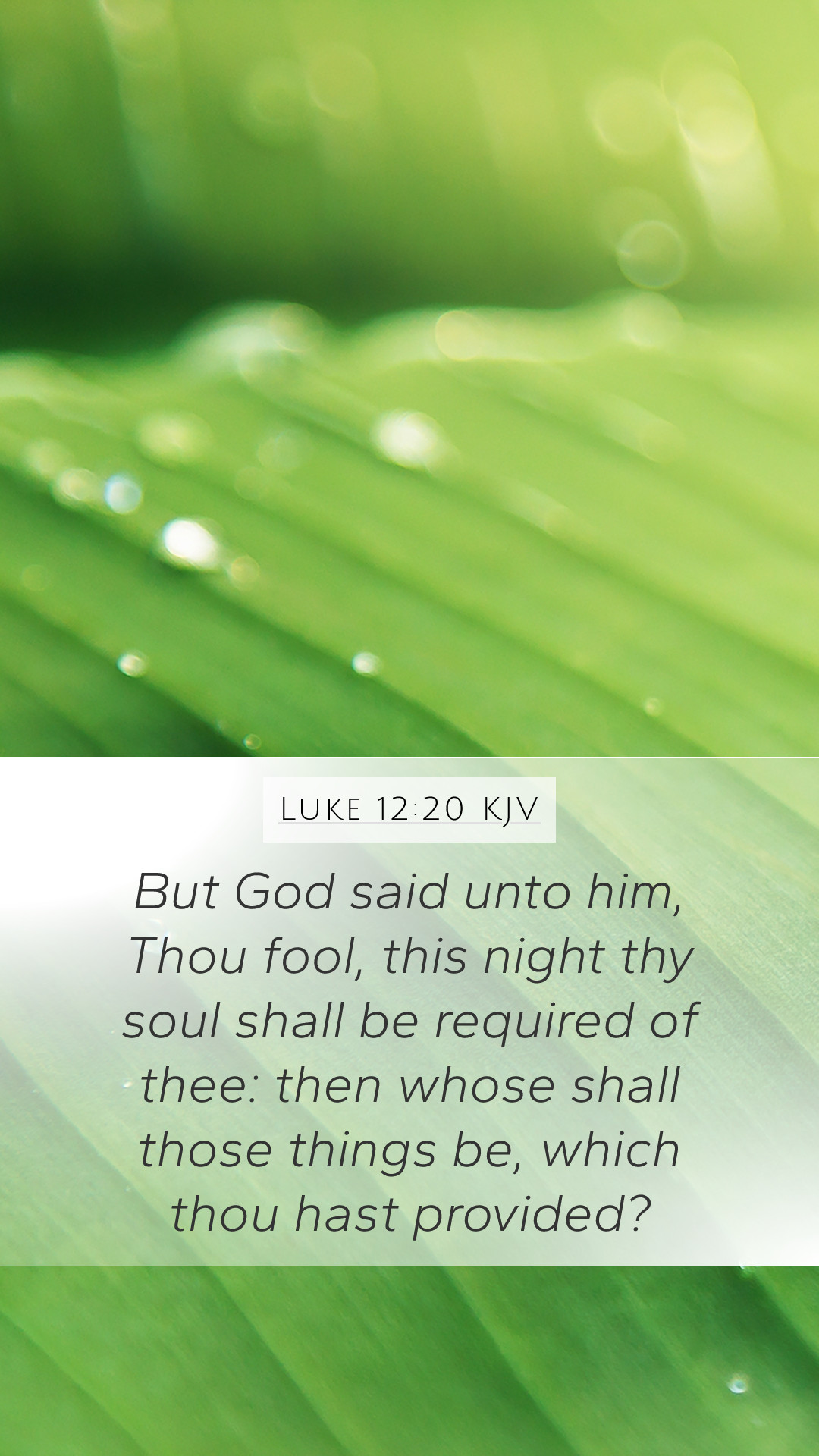Understanding Luke 12:20: A Comprehensive Commentary
Luke 12:20 states:
"But God said unto him, Thou fool, this night thy soul shall be required of thee: then whose shall those things be, which thou hast provided?"
This verse presents a powerful warning about the nature of life, wealth, and responsibility. In examining the verse, we can draw insights from various public domain commentaries, particularly those by Matthew Henry, Albert Barnes, and Adam Clarke. Below is a detailed analysis that combines their perspectives, offering a deeper understanding of this scripture.
Summary of Key Themes
- God's Sovereignty: The verse highlights God's authority over life. The term "fool" indicates a lack of understanding regarding divine priorities.
- The Brevity of Life: This scripture emphasizes the uncertainty and temporary nature of earthly existence.
- The Foolishness of Wealth Accumulation: It critiques the obsession with material possessions without regard for spiritual matters.
- Accountability Before God: It reminds that individuals will ultimately answer for how they use their resources and time.
Bible Verse Interpretations
As we delve into Luke 12:20, the commentaries provide layers of interpretation:
- Matthew Henry's Commentary:
Henry elucidates that the parable preceding verse 20 emphasizes the folly of hoarding wealth for oneself without taking into account the eternal aspect of life. He warns against living solely for earthly gain, stating that such a mindset leads to spiritual bankruptcy.
- Albert Barnes' Notes:
Barnes reflects on the concept of being called a "fool". He points out that God’s declaration serves as a serious wake-up call, emphasizing the foolishness of placing trust in riches. He discusses how this verse acts as a sobering reminder of our mortality and the futility of worrying excessively about wealth.
- Adam Clarke's Commentary:
Clarke expands on the phrase "this night thy soul shall be required of thee". He addresses the suddenness of life's end and implies that individuals may not get the chance to enjoy their amassed wealth. Clarke stresses the importance of living righteously and making preparations for eternity.
Meaning of Bible Verses: An In-Depth Analysis
To fully grasp the meaning of Luke 12:20, we consider the cultural and historical context:
- Historical Context:
The teachings of Jesus often confronted societal values, particularly the materialism rampant in His culture. By addressing the wealthy, Jesus aimed to reshape their views on ownership and legacy.
- Application to Daily Life:
In modern contexts, this verse prompts believers to think about the temporality of resources, urging them to invest in things that have eternal value rather than transient earthly possessions.
- Comparative Analysis:
Luke 12:20 can be compared with Proverbs 27:1, "Boast not thyself of tomorrow; for thou knowest not what a day may bring forth." Both verses delve into the uncertainty of life and caution against complacency in wealth accumulation.
Commentary and Cross References
Related Bible Verses
- Matthew 6:19-21: "Lay not up for yourselves treasures upon earth..." - A teaching on the value of spiritual over material treasures.
- James 4:14: "For what is your life? It is even a vapor..." - Highlights the fleeting nature of human life.
- 1 Timothy 6:7-10: "For we brought nothing into this world..." - A reminder of the limitations of earthly wealth.
- Ecclesiastes 5:15: "As he came forth of his mother's womb, naked shall he return..." - Reflects on the inevitability of leaving everything behind.
- Luke 16:19-31: The Rich Man and Lazarus - A vivid account illustrating the consequences of neglecting spiritual matters for material wealth.
Application of Luke 12:20 in Today’s Context
Understanding Luke 12:20 is essential for anyone engaging in an intense Bible study or seeking meaningful Bible verse explanations. These teachings can greatly inform Bible study groups and online Bible study sessions, allowing participants to explore how this message intersects with real-life experiences and values.
Bible Study Insights
The insights gained from this scripture can be integrated into Bible study lessons by encouraging participants to reflect on their priorities, the use of their time, and how they might be unwisely accumulating earthly treasures.
Conclusion: Understanding the Complete Picture
In conclusion, Luke 12:20 serves as an essential teaching against materialism and an illustration of God's judgment regarding how we manage our resources. It engages readers in a Biblical exegesis that is crucial for anyone seeking to deepen their understanding of Scripture.


